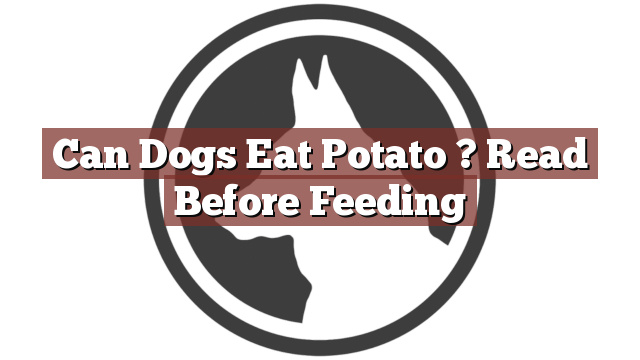Understanding Your Dog’s Dietary Needs
As a responsible pet owner, it is essential to understand your dog’s dietary needs. While dogs are primarily carnivorous, they can also benefit from certain fruits and vegetables in their diet. However, it is crucial to be aware of the foods that may pose a risk to their health. One such food that often raises questions is the potato. So, can dogs eat potato?
Can Dogs Eat Potato? Read Before Feeding
Can dogs eat potato? This is a commonly asked question among dog owners. The answer is yes, dogs can eat potato in moderation. However, there are some important factors to consider before feeding your furry friend this starchy vegetable.
Potatoes themselves are not toxic to dogs. In fact, they can provide some nutritional benefits. Potatoes are a good source of vitamin C, potassium, and fiber. However, it is important to note that dogs cannot digest raw potatoes easily. Therefore, it is crucial to cook them thoroughly before feeding them to your canine companion. Raw potatoes and green potatoes contain solanine, a toxic compound that can be harmful to dogs if consumed in large quantities.
Pros and Cons of Feeding Potato to Dogs
Feeding your dog potato can have both pros and cons. On the positive side, cooked potatoes can be a great source of energy and provide some essential nutrients. They can also help with digestive health due to their fiber content. However, it is important to remember that potatoes should only be a small part of your dog’s diet and should not replace their primary source of nutrition.
One potential drawback of feeding potato to dogs is the risk of weight gain. Potatoes are high in carbohydrates, which can lead to weight gain and obesity if not given in moderation. Additionally, some dogs may have a sensitivity or allergy to potatoes, resulting in digestive issues or skin problems. It is always recommended to introduce new foods gradually and monitor your dog for any adverse reactions.
Conclusion: Weighing the Risks and Benefits of Potato in Your Dog’s Diet
In conclusion, dogs can eat potato, but it should be done in moderation and with caution. Cooked potatoes can provide some nutritional benefits, but they should not be the main component of your dog’s diet. It is crucial to avoid feeding raw or green potatoes to your dog due to the presence of solanine. Additionally, it is essential to monitor your dog for any allergies or sensitivities and consult with a veterinarian if you have any concerns.
As a responsible pet owner, it is crucial to prioritize your dog’s overall health and well-being by providing a balanced diet that meets their specific dietary needs. While it is tempting to share your meals with your furry friend, it is important to research and understand the potential risks and benefits of certain foods before feeding them to your dog.
Thank you for taking the time to read through our exploration of [page_title]. As every dog lover knows, our furry friends have unique dietary needs and responses, often varying from one canine to another. This is why it's paramount to approach any changes in their diet with caution and knowledge.
Before introducing any new treats or making alterations to your dog's diet based on our insights, it's crucial to consult with a veterinarian about [page_title]. Their expertise ensures that the choices you make are well-suited to your particular pet's health and well-being.
Even seemingly harmless foods can sometimes lead to allergic reactions or digestive issues, which is why monitoring your dog after introducing any new food item is essential.
The content provided here on [page_title] is crafted with care, thorough research, and a genuine love for dogs. Nevertheless, it serves as a general guideline and should not be considered a substitute for professional veterinary advice.
Always prioritize the expert insights of your veterinarian, and remember that the health and happiness of your furry companion come first.
May your journey with your pet continue to be filled with joy, love, and safe culinary adventures. Happy reading, and even happier snacking for your canine friend!

